|

Welcome To
My Page

Hello! I am Aniya. Iím nine years old. I live in the U.S.A.
I just love American Girl books. Iím Spanish and French, but sometimes I wish I were a Hawaiian kid.

THE HOLY FAMILY
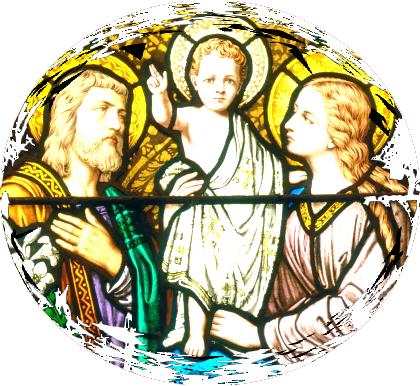
Jesus
Jesus is the second person in the Blessed Trinity. He never committed a sin. We should imitate Jesus to obey Him. He probably had a puppy.
The Blessed Virgin Mary
The Blessed Virgin Mary had a Son named Jesus that was God. She was born without Original sin, was very pure, and never committed a sin in all her life. We should imitate Mary also.
St. Joseph
St. Joseph was a carpenter and is a very pure man. He was Jesusí Foster Father, and he is the Protector of the Church.
My Patron Saint is St. Anthony.
Heís helped me find millions of things! I just love him! Did you know that he preached the Gospel to the fish and they listened to him? Too bad some people didnít listen at first.
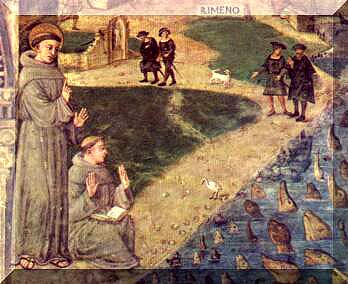
Saint Anthony is well known for his preaching. He has a nick name "The Hammer of God". He preached God's Word with great love, visiting many towns to teach the People of God.
Now just as Bonillo did not believe, there were many other people who did not believe. Anthony wanted to tell them about God and how much God loved them.
All throughout the known world, people had fallen away from believing in God, or they formed their own opinions about things following those that did not teach the truth.
Anthony wanted the people to know the truth about God.
The people Anthony had to preach to were tired from wars, being hungry, and all the talk about God. So Anthony's mission was not an easy one, believe me!
He had to teach them, that there is only one God, Creator of heaven and earth, all-powerful, all wise, all holy, for many believed there were two gods.
He had to teach them that marriage was a sacrament instituted by God and that it was good; had to instruct them again, that each human being has a free will, to choose good or evil and is responsible to God for what they do in their lifetime.
So as you can see the job was not an easy one. Anthony found himself preaching and people were leaving, so his words were going into the wind.
He left the church where he preached and went to the river close by and began to preach to the fishes. All the little fish came to the surface and lifted their heads out of the water to listen to Anthony preach the Word of God. Fish, hurried from up-stream and downstream, listening very closely to what Anthony was saying. The fish remained in this devout position of keeping their heads out of the water until Anthony finished, blessed them and told them to go about their business.

My guardian angelís name is Christopher. Did you notice that
His name has Christ in it? Wow!

Would you like to read the prayer I wrote?

Dear Blessed Virgin Mary,
You got through Christís passion, so please help us with our trials now, and our trials in the future of our lives. Please help us to be little Maryís and Marioís.
Amen.

You should always remember to say your prayers at night, and say your blessing before you eat anything. That way, God is blessing you, and your food, so it wonít harm you. You should always thank Him to.

Would you like to know the Gifts of the Holy Spirit He gave to you when you made your Confirmation?
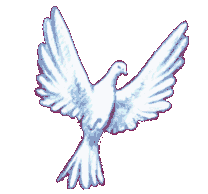

Wisdom:
With this gift of the Holy Spirit we recognize the emptiness of earthly things. With this Wisdom we begin to see God as He truly is: the Highest Good. With this Wisdom we will NEVER believe that we should love a person or power, money or pleasure more than we love God Himself.

Understanding:
With this gift of the Holy Spirit, we are able to recognize that Jesus Christ continues to lead us and guide us by His teachings through the Church and the Successor of St. Peter. This way we may recognize false teachings from His teachings, which are Truth Itself. AFTER Pentecost, the Apostles were able to pierce the Divine Mysteries, which Christ had revealed to them.

Counsel:
With this gift of the Holy Spirit, we able to discover the Will of God, even when there are difficult circumstances. In St. Lukeís, Gospel chapter 12 verse 11 it is written: ďBefore they received the Holy Spirit, the Apostles were inconstant in their thoughts, in their desires and actions, at one time full of high zeal, at other times despairing weak.Ē

Fortitude:
With this gift of the Holy Spirit we grow stronger, even under trials.

Knowledge:
With this gift of the Holy Spirit we are able to grasp the teaching of the Church Ė to know God and His Son, Jesus Christ, Whom He sent.

Piety:
With this Gift of the Holy Spirit we love God as ďOur FatherĒ and we strive always as to do His Will.

Fear of the Lord:
With this Gift of the Holy Spirit we dread sin as the greatest of all evils. This Gift of the Holy Spirit extinguishes our fear of man and our desire for mere human respect. Recall how the Apostles told the leaders of their time: ďBefore for us to obey God rather than men!Ē in the New Testament Book, the act of the Apostles.
Holy Mass
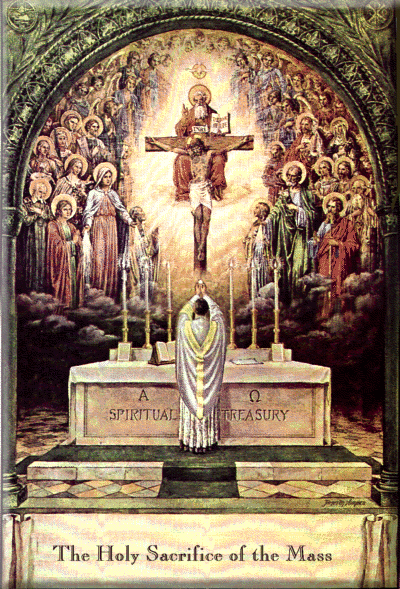
You should go to Mass every day if you can and on the days you are suppose to go to Mass, Sundays and even Feast Days. The Mass teaches everything you need to know about your faith if you have a good priest that teaches in the homily. Do you know what the most important thing that happens in Mass is? It is Holy Communion.
If you know you have a Mortal sin on your soul, you need to go to confession. But if you think you have a Mortal sin on your soul, you might ask your parents because it may be a venial sin, but don't ask during Mass.
Jesus died for our venial sins too so we should confess them to. If you were not able to go to Confession, do not go to Communion.

This is Lordís Prayer in Hawaiian
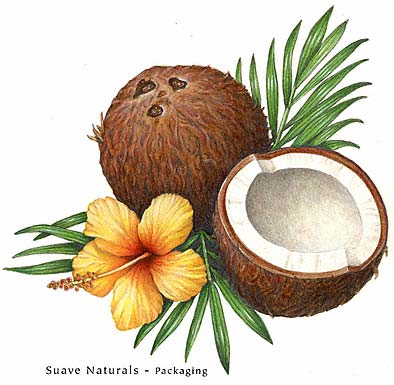
THE LORD'S PRAYER IN HAWAIIAN
E ko makou makua iloko o ka lani,
e hoanoia kou inoa. E hiki mai kou aupuni;
e malamaia kou makemake ma ka honua nei,
e like me ia i malamaia ma ka lani la;
E haawi mai ia makou i keia la,
i ai na makou no keia la. E kala
mai hoi ia makou i ka makou lawehala ana,
me makou e kala nei i ka poe i
lawehala i ka makou. Mai hookuu oe ia
makou i ka hoowalewale ia mai;
E hoopakele no na e ia makou i ka ina;
No ka mea, nou ke aupuni, a me ka mana,
a me ka hoonaniia, a mau loa aku.
Amene.

Hail Mary in Hawaiian
HAIL MARY
Aloha oe, e Maria, uapihaoe ika maikai;
ua noho puka Ha'kume oe;
pomaikai oe iwaena o
na wahine a pau, pomaikai Jesu
ka hua okou opu.
Maria Saneta, makuahine o ke Akua, e pule
aku oe I ka Haku no makou no
ka poe kina nui I keia manawa,
a I ko makou manawa e make ai.
Amen.

This little game is called: Coconut Pass. To play, this is what you need to do:

Coconut Pass
1. Buy a coconut.
2. . Place a mat on the floor to sit on.
3. Get a radio, and put Hawaiian music inside.
4. Get your friends and family. {If you donít have any friends around, ask your family to play. But if you donít have any family around, play with your friends.}
5. Get friends and family to sit in a circle, and then get someone to play and stop the music.
6. Itís a lot like musical chairs, only, you play with a coconut! Pass the coconut around, when the music stops, whoever has the coconut, is out of the game. Whoever is the last one without the coconut wins!
7. The winner can receive a prize like: a pineapple, a lei, or the coconut!
Here is a story about a very saintly priest. I hope you enjoy it.
The Leper Priest of Molokai
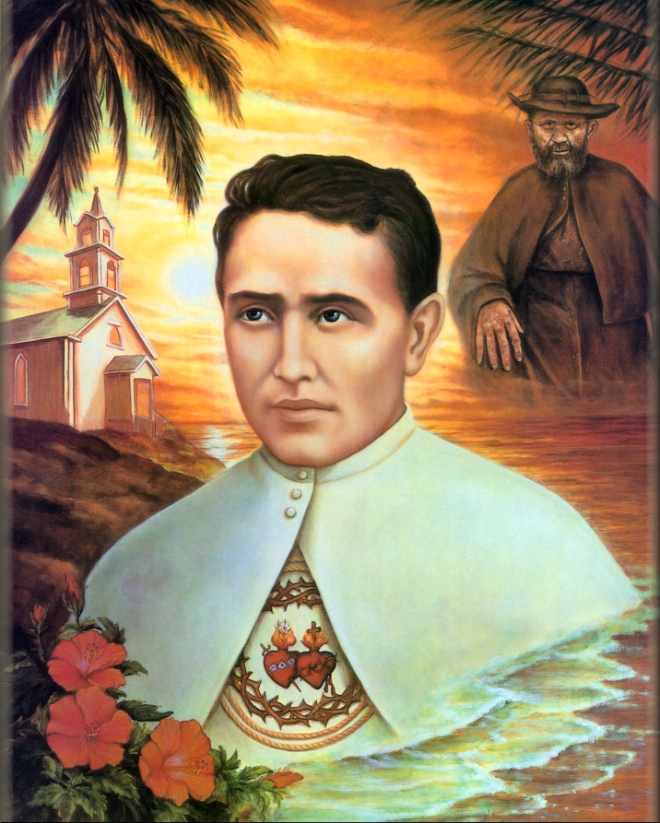
Blessed Damien of Molokai
He was a Belgian priest and a simple man born into a family of farmers. Nature had prepared his square, sturdy, and well developed body to till the soil, but God had summoned him to labor in a different field, to give his life away in order to bring the Sacraments and lessen the suffering to a colony of outcasts on a distant Pacific Island, Molokai, part of the Hawaiian archipelago. This colony was a leper colony in the 19th century, when fear and ignorance caused these poor souls to be shipped, some by force, from all the islands of that region to the isolated north shore of Molokai. Those who were sent there not only suffered from the dread disease, but also from the cruelty of being "abandoned" by the world.
The conditions described in a newspaper at the time were most pitiable. There was not enough to eat:
"Fifty cents per week is allowed each person for food and out of this we must also provide sugar and salt." They need warm wear, "not the thin, rotten clothing that is now brought here-----a useless waste of money." They wanted but lacked basic mail service as the letters they sent never reached their destination. They were lonely and longed for visits from those who cared for them and finally they wanted decent burials: "Let our dead be provided with coffins or else let us be furnished with the materials for making them . . ."
To this condemned community there came in 1873 a singular volunteer, Fr. Joseph de Veuster, better known as Father Damien. He had been shepherded by the will of God and his own compassion to the Hawaiian Islands as a missionary priest. He was courageous, tenacious and his goodness was immediately visible, despite the stocky "coarseness" he inherited from his forebears. his least concern was for himself: ten years after his arrival, in 1883, he, too, would have leprosy. The above painting is a perfect likeness of him as a young priest and in his later years, faithful to the collection of photographs that have been saved.
Father De Veuster, thirty-three, had already served nine years in the Hawaiian missions. He was a member of the Fathers of the Sacred Hearts, who had pioneered Catholicism in the islands. These religious had faced and overcome enormous problems since their arrival in 1827. Now they faced a new and frightful challenge, a leprosy epidemic. To halt the spread of the dread disease, the Hawaiian government had isolated several hundred lepers at Kalaupapa, on the island of Molokai. Catholic lepers there begged for a priest. Many missionaries, despite danger of contagion, had offered to go. The Bishop, Louis Maigret, and Father Modeste, the religious superior of the Sacred Hearts Fathers, had selected Damien to begin the mission. Both were reluctant to put such a crushing burden permanently on this young priestís square and sturdy shoulders. The Bishop and Father Modeste knew the bitter work that had to be done; they hesitated to demand that this one man do so much of it.
Bishop "Louis" accompanied Damien to Molokai, proudly presenting the new pastor to the Catholic lepers. The joy of their welcome and Damienís excitement upon finally arriving at Molokai, dimmed the fact that he carried with him little more than his Breviary. Sacred Hearts religious previously had built a tiny chapel on Molokai, and had dedicated it to St. Philomena. For his first rectory, Damien used the shelter of a pandanus tree, beside the little church. The pandanus offered hospitality to all passing creatures, centipedes, scorpions, ants, roaches and, finally, fleas. Cats, dogs and sheep found shelter under the treeís kind branches. Damien settled in comfortably. A large rock on the side of the tree served as his dinner table. During these first weeks the new missionary took normal precautions to avoid contagion.
With the lepersí help, Damien added the rear wing to Molokaiís chapel. He also built the rectory. The priest was a skillful carpenter. No construction project daunted him.
Molokai was a colony of shame, peopled by lost souls and smashed bodies. Medical care was minimal. Even if decent care were provided, Hawaiians distrusted the white manís medicine, preferring their own witch doctors, or kahuna. White doctors sporadically appeared at government expense. These physicians lived in terror of contagion. One doctor examined lepersí wounds by lifting their bandages with his cane. Another left medicine on a table where lepers could collect it without touching him.
At the outset of his mission Damien aimed to restore in each leper a sense of personal worth and dignity. To show his poor battered flock the value of their lives, he had to demonstrate to them the value of their deaths. And so he turned his attention first to the cemetery area beside his little chapel. He fenced it around to protect the graves from the pigs, dogs, and other scavengers. He constructed coffins and dug graves. He organized the lepers into the Christian Burial Association to provide decent burial for each deceased. The organization arranged for the requiem Mass, the proper funeral ceremonies, and sponsored a musical group that played during the funeral procession.
Damien continued to minister to the sick, bringing the Sacraments of Confession and Holy Communion and anointing bedridden lepers. He washed their bodies, bandaged their wounds and tidied their rooms and beds. He did all he could to make them as comfortable as possible.
He encouraged lepers to help him in all his activities. With their assistance he built everything from coffins to cottages. He constructed the rectory, built a home for the lepersí children. When the colony expanded along the peninsula to Kalaupapa, he hustled the lepers into construction of a good road between Kalawao and Kalaupapa. Under his direction, lepers blasted rocks at the Kalaupapa shoreline and opened a decent docking facility. Damien taught his people to farm, to raise animals, to play musical instruments, to sing. He watched with pride as the leper bands he organized marched up and down playing the music Hawaiians love so well. No self-pity in this colony. Damienís cheerful disposition and desire to serve touched the lepersí hearts without patronizing or bullying them. Little by little their accomplishments restored the sense of dignity their illness threatened to destroy.
<>Under Damienís vigorous lead, a sense of dignity and joy-----and order----- replaced Molokaiís despair and lawlessness. Neat, painted cottages, many of which the priest himself constructed, replaced the colonyís miserable shacks. In everything his lepers came first, yet he was quick to smile, remained of pleasant disposition, and an open and frank countenance.
No one could deny that he was a headstrong person. But no one who knew him could deny that he was a man of warm and tender heart. He quickly forgave injuries and never bore a grudge.
In 1888, the Englishman Edward Clifford visited Damien. "I had gone to Molokai expecting to find it scarcely less dreadful than hell itself," Clifford wrote, "and the cheerful people, the lovely landscapes, and comparatively painless life were all surprises. These poor people seemed singularly happy."
Clifford asked lepers if they missed not being back home. They replied, "Oh, no! Weíre well off here. The government watches over us, the superintendent is good, and we like our pastor. He builds our houses himself, he gives us tea, biscuits, sugar and clothes. He takes good care of us and doesnít let us want for anything."
Stern Puritan ministers felt leprosy was the inevitable result of the Hawaiian peopleís licentiousness. In their puritanical judgment the Hawaiian people were corrupt and debased. The segregation policy would have to be enforced to hasten the inevitable physical and moral collapse of the essentially rotten Hawaiian culture. There were medical doctors who were so convinced of an essential connection between leprosy and sexual immorality that they insisted that leprosy could be spread only through sexual contact.
When Damien entered his prison at Molokai, he had to make a decision. He believed that the Hawaiians were basically good and not essentially corrupt. And now he had to show them belief, regardless of the price. Thus, somewhere during the first part of his stay he made the dread decision to set aside his fear of contagion. He touched his lepers, he embraced them, he dined with them, he cleaned and bandaged their wounds and sores. He placed the host upon their battered mouths. He put his thumb on their forehead when he anointed them with the holy oil. All these actions involved touch. Touch is, of course, necessary if one is to communicate love and concern. The Hawaiians instinctively knew this. And that is why the Hawaiians shrank from the Yankee divines. Although these Yankee religious leaders expended much money on their mission endeavors, few Hawaiians joined their churches. The islanders sensed the contempt in which the puritan minds held them.
<>On this altar which he constructed, Father Damien celebrated Mass each day. From the Eucharist, the priest drew strength to continue his lonely and perilous mission. After leprosy claimed him, and he entered into his "peculiar Golgotha," he found his deepest consolation and hope in the Mass as he felt alone on the frontier of death. He hungered above all for a priestly companion to whom he could confess and receive the Sacrament of Penance. His writings reveal his concern that he would forget the true purpose of his life. In a little notebook, he counseled himself: "Be severe toward yourself, indulgent toward others. Have scrupulous exactitude for everything regarding God: prayer, meditation, Mass, administration of the Sacraments. Unite your heart with God . . . Remember always your three vows, by which you are dead to the things of the world. Remember always that God is eternal and work courageously in order one day to be united with him forever."
During one time when the isolation policy was being strictly enforced, a shipís captain, reacting to the governmentís orders, forbade Damienís bishop to disembark on Molokai. In order to see the bishop, Damien sailed out to the boat. The captain refused Damienís request to board. The priest pleaded in vain with the captain, saying that he wanted to confess his sins. "Bishop," the priest called to the boat, "will you hear my Confession from here?" The bishop consented, and Damien in an exercise of humility that touched all who witnessed it, confessed his sins aloud to the bishop.
One day in December, 1884, while soaking his feet in extremely hot water, Father De Veuster experienced no sensation of heat or pain. The evil disease he had battled for so long now claimed him. In his last years he engaged in a flurry of activity. He hastened to complete his many building projects, enlarge his orphanages, organize his work. Help came from four unexpected sources. A priest, a soldier, a male nurse, and a nun. The soldier, Joseph Dutton, was the most unusual man. He had survived Civil War combat, a broken marriage and several years of hard drinking to show up on Molokaiís shores in July, 1886. He stayed forty-five years without ever leaving the colony. He served the lepers of the Baldwin Home for Boys. Joseph was never seriously ill until just before his death in 1931. He was just short of eighty-eight. Another layman, James Sinnett, a man who had a colorful and checkered career, during which he gained some experience in nursing in Mercy Hospital, Chicago, came to Molokai eight months before Father Damien died. The leper priest called him "Brother James." He nursed Father Damien during the final phase of his illness, and closed his eyes in death. During the last days of Damienís life, Sinnett served as his secretary. He was faithful to the very end, and when Damien died, Sinnett left the colony. Nothing was heard from him thereafter.
Father Louis-Lambert Conrardy, a fellow Belgian, joined Father Damien May 17, 1888. Archbishop William Gross of Oregon generously permitted Father Conrardy to leave his own priest-poor area to labor in Molokai. Archbishop Gross wrote of Conrardy: "I have trampled all over Oregon with Father Conrardy and he is a noble, heroic man ... Though he knows and realizes perfectly that he might succomb to the disease, his voluntary going is real heroism." Conrardy and Damien joined in their unreserved dedication to the lepers. Along with this, Conrardy provided the spiritual and social companionship that Damien so desperately craved.
He died on April 15, 1889 at the age of 49. His Feast Day has been established for the members of his religious community as May 10. It may also be celebrated in the Hawaiian Islands on that day. He has been admitted to the first two ranks of the altar, Venerable and Blessed.
GOD BLESS YOU
OUR LADY, MOTHER OF GOD
PRAY FOR US
ALOHA
|


